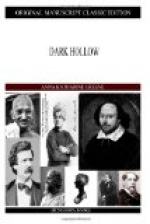“For your daughter,” she declared. “Noble girl! I hope she will be happy.”
The mother was touched. But not quite satisfied yet of the giver’s real feelings towards Oliver, she was not willing to conclude the interview until she understood her small hostess better. She, therefore, looked admiringly at the vase (it was really choice); and, after thanking its donor warmly, proceeded to remark:
“There is but one thing that will ever make Reuther happy, and that she cannot have unless a miracle occurs.”
“Oliver?” suggested the other, with a curious, wan little smile.
Deborah nodded.
“And what miracle—”
“Oh, I do not wonder you pause. This is not the day of miracles. But if my belief in my husband could be shared; if by some fortuitous chance I should be enabled to clear his name, might not love and loyalty be left to do the rest? Wouldn’t the judge’s objections, in that case, be removed? What do you think, Miss Weeks?”
The warmth, the abandon, the confidence she expressed in this final question were indescribable. Miss Weeks’ conventional mannerisms melted before it. She could no more withstand the witchery of this woman’s tone and manner than if she had been a man subdued by the charm of sex. But nothing, not even her newly awakened sympathy for this agreeable woman, could make her untruthful. She might believe in the miracle of a reversal of judgment in the case of a falsely condemned criminal, but not of an Ostrander accepting humiliation, even at the hands of Love. She felt that in justice to this new friendship she should say so.
“Do you ask me?” she began. “Then I feel that I must admit to you that the Ostrander pride is proverbial. Oliver may think he would be happy if he married your daughter under these changed conditions; but I should be fearful of the reaction which would certainly follow when he found that old shames are not so easily outlived. There is temper in the family, though you would never think it to hear the judge speak; and if your daughter is delicate—”
“Is it of her you are thinking?” interrupted Deborah, with a new tone in her voice.
“Not altogether; you see I knew Oliver first.”
“And are fond of him?”
“Fond is a big word. But I cannot help having some feeling for the boy I have seen grow up from a babe in arms to a healthy, brilliant manhood.”
“And having this feeling—” “There! we will say no more about it.” The little woman’s attitude and voice were almost prayerful. “You have judgment enough for two. Besides the miracle has not happened,” she interjected, with a smile which seemed to say it never would be.
Deborah sighed. Whether or not it was quite an honest expression of her feeling we will not inquire. She was there for a definite purpose and her way to it was, as yet, far from plain. All that she had really learned was this: that it was she, and not Miss Weeks who was playing a part, and that whatever her inquiries, she need have no fear of rousing suspicion against Oliver in a mind already dominated by a belief in John Scoville’s guilt. The negative with which she followed up this sigh was consequently one of sorrowful acceptance. She made haste, however, to qualify it with the remark:




